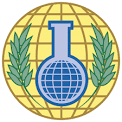THE HAGUE, Netherlands — 30 June 2017 — In a report released by the Organisation for the Prohibition of Chemical Weapons (OPCW), the OPCW Fact-Finding Mission (FFM) confirmed that people were exposed to sarin, a chemical weapon, on 4 April 2017 in the Khan Shaykhun area, Idlib Province in the Syrian Arab Republic.
 The FFM’s mandate is to determine whether chemical weapons or toxic chemicals as weapons have been used in Syria; it does not include identifying who is responsible for alleged attacks. An advance team for the FFM was deployed within 24 hours of being alerted to the incident. For security reasons, the FFM was unable to visit Khan Shaykhun. The rapid deployment to a neighbouring country, however, enabled the team to attend autopsies, collect bio-medical samples from casualties and fatalities, interview witnesses and receive environmental samples.
The FFM’s mandate is to determine whether chemical weapons or toxic chemicals as weapons have been used in Syria; it does not include identifying who is responsible for alleged attacks. An advance team for the FFM was deployed within 24 hours of being alerted to the incident. For security reasons, the FFM was unable to visit Khan Shaykhun. The rapid deployment to a neighbouring country, however, enabled the team to attend autopsies, collect bio-medical samples from casualties and fatalities, interview witnesses and receive environmental samples.
A rigorous methodology was employed for conducting an investigation of alleged use of chemical weapons that took into account corroboration between interviewee testimonies; open-source research, documents, and other records; and the characteristics of the samples including those provided by the Government of the Syrian Arab Republic.
The Fact-Finding Mission report has been shared with States Parties to the Chemical Weapons Convention and the OPCW’s Executive Council, which will consider the FFM’s findings at an Executive Council meeting scheduled for 5 July 2017.
The report has also been sent to the United Nations Security Council through the UN Secretary-General and the OPCW-UN Joint Investigative Mechanism.
The Director-General stated: “The OPCW FFM has confirmed the use of sarin, a nerve agent, at the 4 April incident in Khan Shaykhun in Syria. I strongly condemn this atrocity, which wholly contradicts the norms enshrined in the Chemical Weapons Convention. The perpetrators of this horrific attack must be held accountable for their crimes. In this context, the work of the Joint Investigative Mechanism assumes high importance.”
The OPCW-UN Joint Investigative Mechanism was established by the UN Security Council (Resolution 2235, 7 August 2015) with the mandate to identify “to the greatest extent feasible” individuals, entities, groups, or governments who were perpetrators, organisers, sponsors or otherwise involved in the use of chemicals as weapons in Syria, where the OPCW FFM determines or has determined that a specific incident involved or likely involved the use of chemicals as weapons.
Background
In response to persistent allegations of chemical weapon attacks in Syria, the OPCW Fact-Finding Mission (FFM) was set up in 2014 with an on-going mandate “to establish facts surrounding allegations of the use of toxic chemicals, reportedly chlorine, for hostile purposes in the Syrian Arab Republic”. The FFM has previously confirmed with a “high degree of confidence” the use of chlorine and sulfur mustard as weapons.
The FFM is required to study available information relating to allegations of use of chemical weapons in Syria, including information provided by the Syrian Arab Republic and others. The FFM employs investigative methods to determine if chemical weapons have been used. It interviews witnesses and obtains environmental and bio-medical samples and physical evidence for analysis.
The OPCW Fact-Finding Mission undertook a preliminary assessment of all available information immediately after reports of the incident in Khan Shaykhun and issued a status update on 12 May 2017 to States Parties of the Chemical Weapons Convention and others.
Principal methods for collecting and evaluating the credibility of information included: research into incidents and existing reports; assessment and corroboration of background information; conduct of interviews with relevant medical care providers, alleged casualties and other individuals linked to the reported incident; the review of documentation and records provided by interviewees; the assessment of the symptoms of victims as reported by interviewees; and the collection of bio-medical specimens and environmental samples for analysis.
The 192 countries that are party to the Chemical Weapons Convention have condemned any use of toxic chemicals as a weapon by anyone anywhere in any circumstances as a violation of international law, and have expressed their conviction that those responsible should be held accountable.
The Organisation for the Prohibition of Chemical Weapons is a treaty-based international organisation that operates according to a strict confidentiality regime, which governs the operations of the Organisation, protects the integrity of its investigations, ensures the security of its technical experts, and determines what information can be made public. The OPCW is responsible for the implementation of the Chemical Weapons Convention, which comprehensively prohibits the use, development, production, stockpiling and transfer of chemical weapons.
